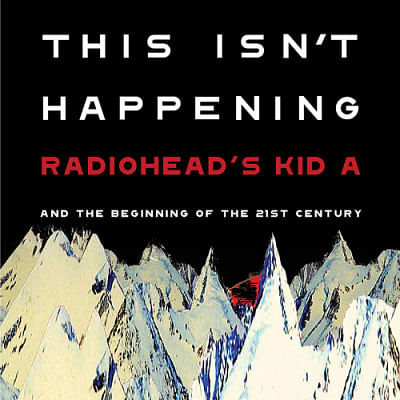The (D)Evolution of the Paranoid Android

To write of Radiohead's 2000 album Kid A is to add to the palimpsest of its criticism, at this stage a glowing, impossibly effusive set of texts. The album's legacy, which stands at the centre of Radiohead's mythos, is so familiar to fans and detractors alike that tackling the very topic runs the risk of hearing about the same old, same old. Steven Hyden, though, with This Isn't Happening (Hachette Books, 2020), invites us into a long, overenthusiastic conversation about the record and any and all bits of popular media that pop into his mind—in other words, its 256 pages read along like that annoying, affable friend that goes on and on about a story he just has to share, and that you, for whatever reason, want to hear about. Thankfully Hyden, the well-accredited rock critic of The AV Club and Pitchfork fame, is overqualified to have written the book on it.
Piecing together comparisons and contextualisation on everything from Bob Dylan to 9/11, the book, subtitled Radiohead's Kid A and the Beginning of the 21st Century, takes a good deal of time, and joy, in underlining every aspect of the title. It relishes in the band's biography, discography, the onset as well as progress (perhaps the author and the band would call it regress) of the 21st century, the contemporaries, the music scene, and both the band's UK and the author's US.
The most compelling moments of This Isn't Happening lie within Hyden's attempts at making sense of an album consciously made oblique—an impulse reaction of lyricist Yorke that the writer connects to criticisms of "obviousness" the band faced on their debut release and the recollection of a college friend complaining to Yorke that his lyrics "left nothing to the imagination." What was a fair bit of friendly critique stuck seemingly more than any praise or disdain the band would ever receive.
The book does well to convey the multitudes that can be brought out of the album. With clipped and sudden, and just as easily lost, sounds wafting in and out of the record, Hyden is conscious of its free improvisation and Dada-inspired nature, and wisely presents the generational ennui at the heart of Kid A rather than tread old ground, though he perhaps spends too much of his breath restressing and re-analogising the same points.
The book is at its worst not when it draws comparisons to Oasis or Linkin Park or Vanilla Sky, but when Hyden steers a bit too much into "world" problems of the early 21st century. He describes the atrocities occurring between 2000-2003 ("the 2000 US presidential election, September 11, and the wars in Afghanistan and Iraq"), which he frames the album in, as the most traumatic of his generation, which only reminds us that this book was published but not written in 2020. If there's one cataclysmic event that shook the 21st century, we're presently living through it, and the book sounds dated the more Hyden writes on about that time period. As for politics, as the writer himself points out, Radiohead truly ever wrote the one overtly political song, "2+2=5," with the band themselves rejecting merely political readings of their work as "shallow." To Hyden's credit, he never really goes too far, and even when it feels like he might, he is only expressing his own experiences—a credit to his conversational style more than anything.
This book, ultimately, is one of history, written like chapters of Nick Hornby's High Fidelity. For all the readers who spent the better part of this century illegally downloading music ("older" readers may pop at the mentions of LimeWire), this book may be one to hold close. When the writer traces personal and professional history by way of the signposts that music has taken the form of, you realise you're not like him, you are him.
Mehrul Bari S. Chowdhury is a writer, poet, and artist. His work has appeared or is forthcoming in Kitaab, Sortes Magazine, and Marías at Sampaguitas, among others.

 For all latest news, follow The Daily Star's Google News channel.
For all latest news, follow The Daily Star's Google News channel. 



Comments